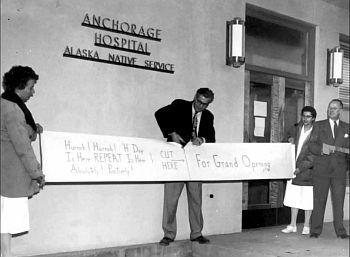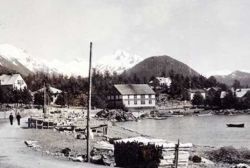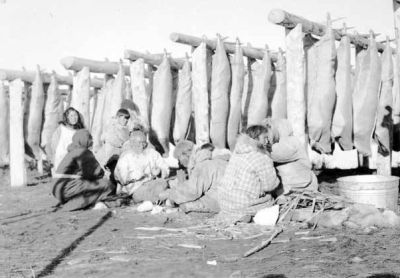
Publisher:
Bonnie King
CONTACT:
Newsroom@Salem-news.com
Advertising:
Adsales@Salem-news.com

~Truth~
~Justice~
~Peace~
TJP
Jun-07-2022 17:06

 TweetFollow @OregonNews
TweetFollow @OregonNews
The Climate Front: People Who Live There, Part 2
Robert Lundahl special to Salem-News.comAlaska's many cultures developed their own way of doing things over tens of thousands of years.
 In 1957, the average age of death for Alaska Native people was 30.5 years, with 34.6 percent of all deaths under one year of age. Photo: Alaska Native Medical Center |
(LOS ANGELES, Calif.) - I’m joined once again by Patrick Anderson (Tlingit), Executive/CEO, Health Care Administrator, Alaska.
Our conversation is about how trauma, both intergenerational and acquired, is compounded by difficulties, logistical, economic, and elemental, along the front lines of climate change in America.
In one Alaska village, Kivalina, on the Chukchi Sea above the Arctic Circle, survival itself can be overwhelming. The island, on which the village lies, is threatened by rising sea levels and coastal erosion caused by warmer temperatures due to climate change.
PATRICK ANDERSON
Robert Lundahl:
Can you give me a snapshot of what kinds of health impacts you began to see when you were working in these villages both as an attorney and as a healthcare provider?
Anderson:
Yes, it was puzzling to me why Alaska natives had higher rates of autoimmune diseases, higher rates of cancer, higher rates of diabetes.
A lot of the transmissible diseases ran rampant, a lot of upper respiratory diseases and issues so when you are in a place that has substandard housing, air exchanges aren't as frequent, and mold becomes a problem.
Also, the average household size is fairly high and it's a small close-knit community, so if if some kind of a transmissible disease comes in like a flu, it can move through the community very quickly.
So something like the COVID virus can move through very crowded places very quickly, and we did have that experience in western Alaska.
A lot of villages did shut down. But it was puzzling why a lot of these other issues existed, and one of the points made - the scientific points made by the adverse childhood experience study is that toxic stress can take a significant amount of time off of an average lifespan.
So in the adverse childhood experience study they studied 10 different experiences that children have if you accumulated six or more of those, what the data said is that you have, your cohort has on average a 20 year shortened lifespan almost.
 1953 Alaska Native Medical Center Grand Opening |
Arthritis was a huge problem in much of Alaska, but when you look at the stress chemicals, the inflammation that stays in your body as a toxically stressed adult, it starts to explain a little bit of the reason why some of these things happen.
With cancers, smoking is something that gives people relief from stress and so we have a very high rate of smoking within our communities and then we also had in other parts of Alaska, a lot of smoked foods so smoked salmon - people would have wood stoves in their homes so you get to introduce to a lot of different pollutants as well.
One physician that I worked with years and years ago told me that the physicians at the Alaska Native Medical Center were probably among the most experienced in stomach cancers because they had a very high rate of stomach cancer among Alaska natives back in the 90s and 2000s.
So now those are a few of the reasons, Robert, that I believe that the health impacts are a little bit more severe in the Indian country and Alaska Native country than they are for the rest of the country not to minimize that we do have problems in all of our areas.
Robert Lundahl:
Well when we talked in our pre-interview yesterday, we went through a lot of these topics and I thought, oh my gosh, there's a lot on the table here to discuss, and one of them, to backtrack - is the historic relationship between tribes and the United States government, the Russian government, colonizing forces if you will.
I was surprised to learn that however well-intentioned, when, let's say a school or a church is built, it reflects a kind of tie down to a place or location or architecture, that was basically imposed from the outside, whereas many of these cultures may have been highly nomadic.
Do you want to comment about that? I was thinking of the impacts of that too, you know, that not just the stresses of the place but you have, you know with the boarding schools in Canada we have 750 bodies being found in a field, which has shaken up, you know, the tribal entities of Canada and the political infrastructure, and is a reckoning in a certain way, that all might not have been fair.
 Mission School, Sitka. 1896-1913 |
That's uh an understated way of saying it, you're absolutely right.
Robert Lundahl:
Well, I'm a writer and so we lead people into the topic in a way yes.
Patrick Anderson:
Absolutely it's called a leading question. In law we are prohibited from doing that but we find ways of bringing that back in and I appreciate that.
Historical Trauma has always been around. It is the treatment and infliction of certain behaviors by a dominant culture, on a subdominant culture.
What was interesting about Alaska is that when the Russians came to Alaska, they claimed it under Western European law but actually had very little territory that they had any control over.
Initially very small parcels in Kodiak, a little bit in Sitka - a couple of forts that were heavily defended, was all the contact they had. They were here predominantly for the sea otter, and they harvested a lot of sea otter.
They created a great deal of devastation among the Aleut (Unangan) hunters because the Aleut hunters were very prolific at being able to capture sea otters, and so there's a lot of historical novels that are based on somewhat factual accuracy that talk about the intensely brutal treatment that Russians inflicted upon Aleuts in order to get them to hunt.
And then, when the treaty of purchase came and Russia gave up its rights to Alaska - there were very few places that had any governmental structure.
So what happened is that churches started to come in and began dividing up Alaska so we ended up with a number of churches, Presbyterians, Catholic, Evangelical Mission Covenant Church, Russian Orthodox and each trying to impose their own will upon a culture that had developed over tens of thousands of years their own way of doing things, and so we ended up with cultural suppression.

1930: Harvest of reindeer carcasses at Kivalina |
There are a lot of the historical artifacts, we call them, they're really a cultural part of our ceremonies, that were burned because of religious beliefs.
Alaska natives were not allowed to become citizens in the 1920s until they gave up their "savage ways" and they had to have at least five white people attest to them giving up their "savage ways."
Boarding schools - a number of my friends and colleagues tell me about how they were prevented from speaking their language, how they were punished physically for doing that, and of course separated by long distance from their family, sometimes for four, five, six, eight, nine, years.
Boarding schools went all the way down to Oklahoma which is where my uncle went for a little while and so a lot of things began happening that started with this historically imposed trauma, but has now morphed into intergenerational trauma transmitted from grandparent to parents to children.
And we're now starting to understand the extent to which that has impacted Alaska native cultures. So when you look at the diffusion of things like alcohol abuse, it is in it is higher in populations that have higher numbers of these adverse childhood experiences.
When you look at drug abuse one of the statistics that absolutely blew me away is that if you are a young male between the ages of about 18 and 34 and you have six adverse experiences you're about four thousand two hundred percent more likely to become an iv drug user later in life than someone who has zero.
So, there's an explanation for a lot of these things that happened, but the long and the short of it is that when you have accumulated through this childhood acquired experience a level of toxic stress, your body is constantly trying to adjust.
So, we have among this population of high toxically stressed individuals, higher rates of crime, higher rates of addiction, higher rates of physical abuse, sexual violence, great deals of anger and trying to deal with that at the same time as you have these issues of adult acquired trauma.
And when you have a huge storm and you're sitting in a place like Kivalina - winds are blowing 60-80 miles an hour - and you're wondering what's going to happen to the foundation of your home if it's sitting right there on the shoreline.
That stays with you day in and day out and contributes to those health issues, to that shorter lifespan - there's very little joy to be found when you have high levels of toxic stress.
(End Part 2).
Robert Lundahl: We’ll continue my interview with Patrick Anderson in Part 3, People Who Live There. Next time.
University of Alaska Photo Credits: Glenn H. Bowersox papers, Archives and Special Collections, Consortium Library; LaRoche photo no. 224; Alaska Native Medical Center.
 Patrick Anderson, Thunderbird Clan (Tlingit). Attorney, Health Administrator and Tribal Manager, discusses the Health of Alaska Natives in the era of Climate Change. Patrick most recently served as CEO of Alaska RurAL Cap, and as a long-term Board Member of Sealaska Corporation. Patrick’s focus is on Toxic Stress, Adverse Childhood Experiences (ACEs), intergenerational trauma, and their remedies. Visit patrickandersonsfuturestate.com.
Patrick Anderson, Thunderbird Clan (Tlingit). Attorney, Health Administrator and Tribal Manager, discusses the Health of Alaska Natives in the era of Climate Change. Patrick most recently served as CEO of Alaska RurAL Cap, and as a long-term Board Member of Sealaska Corporation. Patrick’s focus is on Toxic Stress, Adverse Childhood Experiences (ACEs), intergenerational trauma, and their remedies. Visit patrickandersonsfuturestate.com.
Articles for June 6, 2022 | Articles for June 7, 2022 |
Quick Links
DINING
Willamette UniversityGoudy Commons Cafe
Dine on the Queen
Willamette Queen Sternwheeler
MUST SEE SALEM
Oregon Capitol ToursCapitol History Gateway
Willamette River Ride
Willamette Queen Sternwheeler
Historic Home Tours:
Deepwood Museum
The Bush House
Gaiety Hollow Garden
AUCTIONS - APPRAISALS
Auction Masters & AppraisalsCONSTRUCTION SERVICES
Roofing and ContractingSheridan, Ore.
ONLINE SHOPPING
Special Occasion DressesAdvertise with Salem-News
Contact:AdSales@Salem-News.com




Terms of Service | Privacy Policy
All comments and messages are approved by people and self promotional links or unacceptable comments are denied.
Anonymous June 14, 2022 4:04 pm (Pacific time)
part 3....chemtrails
[Return to Top]©2026 Salem-News.com. All opinions expressed in this article are those of the author and do not necessarily reflect those of Salem-News.com.